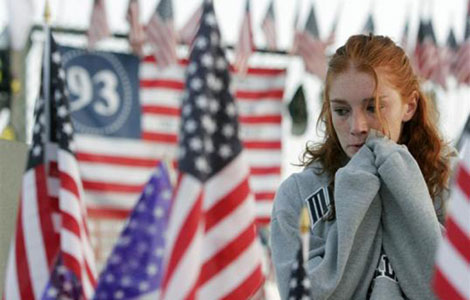Sept 11, remembrance and reassessment
Updated: 2011-09-09 07:54
By Chen Weihua (China Daily)
|
|||||||||||

It is proper for New York Mayor Michael Bloomberg to urge people on Tuesday to call the place known as Ground Zero by its new name: The World Trade Center and the National September 11th Memorial and Museum.
It is time for Americans to move on from the tragic attacks on Sept 11, 2001. But it is also time for US policymakers to rethink their strategy which has clearly gone wrong over the past decade.
As top US officials keep saying, the world today is safer than 10 years ago, however, they also admit, as Defense Secretary Leon Panetta did on Tuesday, that the potential for another devastating terrorist attack remains real.
That's why security checks have become ever tighter at US airports. In New York City, armed police patrol subway stations, and bag checks have become routine. Few might recall the good old days when they did not need an ID to board a domestic flight.
For the US, the past 10 years have been a decade of endless war, a war that still has no end in sight. During the decade, the US defense budget has more than doubled from $316 billion in 2001 to $708 billion in 2011. More than $1.3 trillion has been spent on the wars in Iraq and Afghanistan, plus some $1 billion on the recent intervention in Libya.
While the four 9/11 attacks killed 2,996 people, mostly US civilians, the wars in Iraq and Afghanistan have caused many more civilian deaths.
Like the victims in the United States, these people are also someone's husband, wife, son, daughter, father, friend and co-worker. Their deaths have caused just as much trauma to the people around them. The destruction of their homes has been no less appalling than the destruction of the twin towers.
That explains why, after the US has spent more than a trillion dollars on the wars and given billions of dollars in foreign aid, survey after survey show that the two wars have radicalized Muslims around the world to unprecedented levels of anti-US feeling.
Within the US, Muslims, which make up less than 1 percent of the population, have felt increasingly suspected in society.
Right after 9/11, the world had enormous sympathy for Americans. Yet that valuable political capital has been totally "squandered", as some US politicians have admitted.
Many countries no longer see the War on Terror as the top priority. The poor and developing countries are primarily concerned about hunger, diseases, economic development and environmental degradation.
Even for most US citizens, the excessive spending on military and homeland security in the past decade has denied key investments necessary in areas such as infrastructure and education. They also care more about jobs as the US economy runs the risk of a double-dip recession.
All these suggest that the US needs to adopt a new strategy.
For the past decade, the US has waged wars, imposed sanctions and intervened in other countries in the name of spreading freedom and democracy, despite the fact that the latter has been hypocritical given the double standards applied to countries in the Middle East.
In his book How Enemies Become Friends, Charles Kupchan, a professor of international affairs at Georgetown University, refutes the claim that democracy is necessary for peace. He demonstrated that non-democracies can be reliable contributors to international stability.
This suggests that the US should learn how to seek rapprochement and co-exist peacefully with countries, which they consider different or non-democratic. The US should learn how to accommodate differences through diplomacy, instead of relying heavily on military means or sanctions.
The author, based in New York, is deputy editor of China Daily US edition. E-mail: chenweihua@chinadaily.com.cn
(China Daily 09/09/2011 page8)




